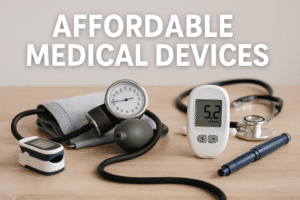Affordable Medical Devices Revolution: 5 Powerful Ways MAHE and BPL Medical Are Transforming India’s Healthcare Landscape
Manipal Academy of Higher Education (MAHE) and BPL Medical Technologies have forged a strategic alliance to accelerate India’s self-reliance in medical device innovation, aligning with the ‘Make in India’ vision. The collaboration merges MAHE’s academic research and clinical expertise with BPL’s manufacturing prowess to develop cost-effective, high-quality healthcare solutions for underserved markets.
Central to this effort is MAHE’s MIDAS hub, India’s first private-sector medical innovation center, which connects 25 institutions and 30 industry partners to streamline the commercialization of indigenous technologies. With India’s medical device market relying on 80% imports, the partnership aims to reduce dependency by producing locally validated devices, such as portable diagnostics and surgical tools. BPL’s shift from trading to manufacturing, supported by its new Jigani facility, underscores this transition.
Students gain hands-on experience through internships and projects, bridging academia with real-world healthcare challenges. While hurdles like scaling production and regulatory compliance persist, the alliance prioritizes affordability and accessibility, particularly for rural communities. By fostering innovation rooted in local needs, this partnership exemplifies how academia-industry synergy can transform India’s healthcare landscape, turning homegrown ideas into life-saving realities.

Affordable Medical Devices Revolution: 5 Powerful Ways MAHE and BPL Medical Are Transforming India’s Healthcare Landscape
In a landmark move poised to reshape India’s medical technology landscape, Manipal Academy of Higher Education (MAHE) and BPL Medical Technologies have joined forces under a strategic partnership aimed at accelerating indigenous medical device innovation. This collaboration, announced as part of MAHE’s “Year of Excellence in Industry-Academia Collaboration,” transcends conventional alliances, merging academic rigor with industry expertise to address critical gaps in healthcare accessibility and affordability.
A Synergy of Vision and Expertise
At its core, the partnership seeks to tackle two pressing challenges: reducing India’s reliance on imported medical equipment and equipping future healthcare professionals with hands-on experience. By leveraging MAHE’s research prowess and BPL’s manufacturing capabilities, the collaboration aims to develop cost-effective, high-quality devices tailored for rural and underserved markets.
Dr. HS Ballal, Pro Chancellor of MAHE, emphasized the transformative potential of such alliances: “By uniting academia and industry, we’re not just creating devices—we’re building ecosystems that empower communities.” This sentiment echoes India’s broader ‘Make in India’ mission, which prioritizes self-reliance in critical sectors like healthcare.
The MIDAS Hub: A Catalyst for Homegrown Innovation
A cornerstone of this collaboration is MAHE’s Medical Instruments, Devices & Allied Services (MIDAS) hub—the nation’s first private-sector medical innovation center. Supported by the Department of Science & Technology, MIDAS connects 25 academic institutions and 30 industry partners to streamline the journey from concept to commercialization.
Dr. Arun Maiya, Dean of Manipal College of Health Professions, notes, “MIDAS isn’t just about invention; it’s about creating viable solutions that hospitals and clinics can adopt immediately.” The hub’s specialized workshops and training programs aim to nurture a new generation of innovators while fast-tracking the development of technologies like portable diagnostic tools and low-cost surgical equipment.
Why This Partnership Matters
India’s medical device market, valued at $11 billion in 2023, remains heavily import-dependent, with overseas products accounting for 80% of sales. This reliance drives up costs, limiting access for rural populations. BPL Medical’s shift from trading to manufacturing—bolstered by its new Jigani production facility—aligns with national efforts to reverse this trend.
Guruswamy Krishnamurthy, CEO of BPL Medical, highlights the strategic edge MAHE brings: “Access to their testing labs and clinical insights allows us to iterate faster, ensuring devices meet real-world needs.” For students and researchers, this translates to immersive internships and projects addressing tangible healthcare challenges—from maternal care innovations to AI-driven diagnostic tools.
The Road Ahead: Challenges and Opportunities
While the partnership holds immense promise, success hinges on navigating hurdles like scaling production without compromising affordability and ensuring regulatory compliance. However, the collaboration’s focus on “clinically validated” solutions—tested in MAHE’s network of 30 hospitals—adds a layer of practicality often missing in academic research.
Moreover, the alliance could set a precedent for India’s education sector. Lt Gen (Dr) M D Venkatesh, MAHE’s Vice Chancellor, stresses, “Industry partnerships are no longer optional; they’re essential for curricula to stay relevant.” This model, blending classroom learning with real-world problem-solving, could inspire similar initiatives nationwide.
A Blueprint for the Future
As MAHE and BPL Medical Technologies embark on this journey, their collaboration underscores a larger truth: Solving India’s healthcare inequities requires bridging the gap between labs and communities. By fostering innovation rooted in local needs and global standards, this partnership doesn’t just aim to manufacture devices—it seeks to redefine how India approaches healthcare challenges.
For a nation striving to become a global medtech hub, such alliances are more than strategic moves; they’re a testament to the power of collective vision in driving meaningful change. The true measure of success? When a nurse in a rural clinic can access a life-saving device designed not just in India, but for India.
You must be logged in to post a comment.